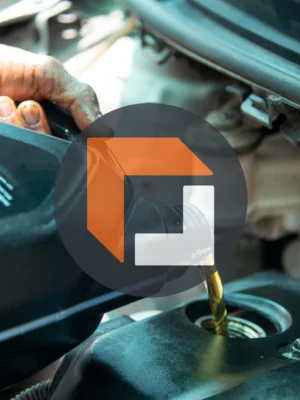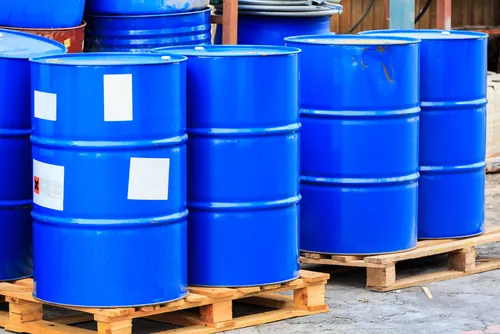
Shipping Industrial Lubricants and Oils
Ship Your Oils and Lubricants with Confidence
From barrels of motor oil to totes of synthetic lubricants, FreightCenter helps businesses ship industrial oils with confidence. Our carrier network is experienced in handling hazardous materials, and our team ensures every shipment is compliant, cost-effective, and on schedule.
Shipping industrial lubricants and oils requires more than just a truck; it demands safety, precision, and regulatory know-how. From sealed drums to bulk totes, these high-value liquids must be packaged, labeled, and documented correctly to ensure compliance and avoid costly delays.
We specialize in freight solutions for hydraulic fluids, greases, and synthetic oils, connecting you with trusted carriers, competitive rates, and expert support. Whether you’re moving a few containers or full truckloads, this guide will walk you through everything you need to know to ship lubricants and oils efficiently and confidently.
Thousands of businesses trust FreightCenter to move their freight faster, smarter, and cheaper! From unbeatable rates to top-notch service, our customers are raving about their shipping success.
See why they keep coming back!
Award-Winning Service, Trusted by Shippers Everywhere!
- 2021, 2017 & 2016 Food Logistics’ Top Green Providers
- 2021 & 2018 Supply & Demand Chain Executives’ Pros to Know: Matthew Brosious
- 2020 & 2019 Top Food Logistics’ 3PL & Cold Storage Provider Award
- 2020 & 2019 Business Observer’s Top 500 Companies on the Gulf Coast
- 2020 & 2017 SmartWay® Transport Partner
- 2020 & 2017 Food Logistics’ Champions: Rock Stars of the Supply Chain
- 2020 Best of Palm Harbor Awards for Local Businesses
- 2017 Green Supply Chain Award from Supply & Demand Chain Executive
- 2017 Tampa Bay Business Journal Heroes at Work
- 2016, 2015, & 2012 Food Logistics Top 100 Software and Technology Providers
- 2013 Tampa Bay Business 100 by Tampa Bay Business Journal
- 2013 Top 100 Great Supply Chain Partners by SupplyChainBrain
- 2012 TIA Samaritan Award Honorable Mention
- 2012, 2011 & 2010 TBBJ Fast 50 Recipient
- 2013, 2011, & 2010 Diversity Business Top Businesses

Why Choose FreightCenter for Shipping Industrial Lubricants and Oils
FreightCenter is more than a broker—we’re your logistics partner. Shipping industrial lubricants and oils often involves hazmat classification, packaging regulations, and specific carrier requirements. We make it easy by:
-
Connecting you to 50+ trusted carriers experienced with oil freight.
-
We offer real-time freight quotes for drums, totes, and bulk shipments.
-
Coordinating hazmat documentation and DOT compliance.
-
We provide freight insurance and white-glove options for sensitive cargo.
-
Supporting manufacturers, energy companies, auto suppliers, and more.
How to Ship Industrial Lubricants & Oils: Step-by-Step
After years in this business, here’s our real-world guide on how to get your oils and lubricants from point A to B without headaches (or spills).
First Things First: Know What You’re Shipping
Before anything else, figure out if your freight is considered hazardous. Most industrial oils fall under Class 3 (flammable) or Class 9 (miscellaneous hazardous). Check the flashpoint – anything below 140°F is typically Class 3. This classification determines EVERYTHING else about your shipment.
Packaging That Won’t Leak or Break
Don’t cheap out here! For hazardous lubricants:
- Steel drums are the go-to for most shipments
- IBC totes work great for larger volumes
- ISO tanks for the really big orders
Whatever you choose, make sure it’s UN-certified for your specific material.
Labels & Paperwork (The Boring But Crucial Part)
Every container needs proper hazard labels, UN numbers, and handling instructions. Your shipping papers must include:
- Exact product name (the official DOT one, not your marketing name)
- Hazard class and UN number
- Quantity and type of packaging
- Emergency contact info
Always keep Safety Data Sheets handy.
Loading & Securing Your Shipment
Seriously, don’t just throw drums on a truck and hope for the best. Use:
- Proper palletizing techniques (2-4 drums per pallet, properly strapped)
- Blocking and bracing to prevent shifting
- Secondary containment for extra protection
We once saw an entire truckload of improperly secured drums tip over during a hard brake. The cleanup took days and cost thousands.
Finding a Carrier Who Won’t Freak Out
Not all trucking companies will touch hazmat shipments. Find carriers who:
- Have hazmat endorsements
- Understand industrial shipping requirements
- Have a good safety record
Emergency Planning
Hope for the best, plan for the worst:
- Include spill kits with bulk shipments
- Make sure emergency response info is easily accessible
- Have a clear plan for what happens if something goes wrong
Stay on Top of Your Shipment
Track every shipment like a hawk. The technology exists now – use it! Regular check-ins with our team and getting status updates help catch problems before they become disasters.
This isn’t the most glamorous part of the industrial supply business, but getting it right keeps your customers happy and keeps you out of trouble with regulators. Trust us, the headache of doing it right the first time is way less painful than dealing with spills, fines, or rejected shipments!
Whether you’re a manufacturer, supplier, or distributor, we provide custom freight solutions that match your exact needs and product type.
We arrange both Less-Than-Truckload (LTL) and Full Truckload (FTL) freight for products like: 55-gallon oil drums, IBC totes of industrial fluids, Palletized containers of hydraulic or synthetic oils. FreightCenter ensures your shipment is properly classified, packaged, and routed through carriers that specialize in liquid and viscous product freight.
Not all carriers are licensed or equipped to transport hazardous materials. FreightCenter’s vast network includes FMCSA-registered hazmat carriers who understand: UN packaging requirements, DOT hazmat documentation, Spill containment and emergency response protocols. Our team helps you ensure that every load meets 49 CFR regulations and arrives in full compliance.
For temperature-sensitive oils or specialty fluids that degrade in heat or cold, FreightCenter can arrange refrigerated or climate-controlled freight services. These are ideal for: Synthetic lubricants, High-performance engine oils, Seasonal lubricant blends. We help assess temperature risk based on route, time of year, and product specs.
Need to move industrial oil in large volumes? FreightCenter can help coordinate bulk transport options, including tanker trucks for non-packaged liquid freight. These solutions are available on a case-by-case basis and include routing consultation, cost analysis, and regulatory compliance support.


FreightCenter Is Here to Help Keep Things Running Smoothly!
When it comes to shipping industrial lubricants and oils, precision matters. That’s why businesses across the U.S. choose FreightCenter not just for our pricing but for our proven ability to move complex freight safely, efficiently, and in full compliance with every regulation. Whether you’re shipping compressor oil to a warehouse or a pallet of hydraulic fluid to a remote job site, we tailor every shipment to your specs.
With access to 50+ top-rated freight carriers, we offer real-time rate comparisons, custom routing options, and carrier expertise specific to hazardous materials and bulk liquid freight. Our team of logistics experts becomes an extension of yours, helping you navigate DOT compliance, proper documentation, and delivery scheduling.
Need it fast? Need it secured? Need it affordable?
We’ve got you covered every time.
Get your free quote now, or talk to a freight expert at (800) 716-7608 and start shipping with confidence.
Frequently Asked Questions about Shipping Industrial Oils and Lubricants

Q. Can industrial lubricants and oils be shipped by freight?
Yes, industrial lubricants and oils can be shipped via LTL (Less-Than-Truckload), FTL (Full Truckload), or specialized freight services, depending on the volume and packaging requirements.
Q. Are industrial lubricants considered hazardous materials (HAZMAT)?
Some lubricants and oils are classified as hazardous depending on their chemical composition. Always refer to the Safety Data Sheet (SDS) to determine the correct classification and shipping method.
Q. What documentation is required to ship lubricants or oils?
You typically need a Bill of Lading (BOL), Safety Data Sheet (SDS), and in some cases, HAZMAT shipping papers depending on the product’s classification.
Q. How should lubricants and oils be packaged for shipping?
Lubricants should be sealed in approved containers such as drums, pails, or IBC totes, and then palletized and shrink-wrapped to prevent leaks, shifting, or contamination during transit.
Q. Can I ship small quantities of oil or lubricant?
Yes, small quantities can be shipped via LTL freight, making it a cost-effective option for partial loads, replacement stock, or routine resupplies.
Q. Do lubricants require temperature control during shipping?
Some synthetic or specialty lubricants may require temperature-controlled shipping or freeze protection in cold weather. Check the manufacturer’s storage and handling guidelines.
Q. What’s the best way to ship bulk lubricant orders?
Full Truckload (FTL) freight is ideal for bulk lubricant shipments. It minimizes handling, keeps loads together, and allows for direct delivery with fewer stops.
Q. Can FreightCenter help with HAZMAT-compliant shipping?
Yes! FreightCenter works with certified HAZMAT carriers and can help you ensure compliance with all DOT and carrier-specific safety requirements.
Q. What happens if my lubricant shipment leaks during transit?
Carriers must be notified immediately. Proper packaging, labeling, and absorbent liners help prevent damage and environmental hazards. Insurance can cover qualified losses.
Q. How do I get a freight quote for shipping lubricants or oils?
You can request a free quote through FreightCenter by providing shipment details such as dimensions, weight, packaging type, destination, and whether the product is classified as hazardous.
Shipping Tips for Lubricants and Oils

Use Reconditioned Drums or Totes (If Permitted)
If you're not shipping hazardous or highly sensitive lubricants, consider using certified reconditioned containers. These can cost significantly less than brand-new drums or IBC totes and are still compliant with most carrier and DOT standards. It’s a sustainable, cost-effective way to reduce packaging expenses without compromising safety.

Optimize Pallet Configurations to Reduce Freight Class Costs
Most people focus on weight, but dimensional efficiency matters just as much. Stacking drums or pails to maximize vertical space and reduce unused gaps on pallets can help you qualify for a lower freight class, which directly impacts your total cost. A small shift in pallet configuration could save you hundreds over time.

Avoid Shipping Near the End of the Week
Lubricants—especially those that are temperature-sensitive—can sit in non-climate-controlled terminals over the weekend if shipped late in the week. To avoid freeze risks, storage delays, or additional handling charges, plan your shipments for early in the week, ensuring faster movement through the freight network and better transit conditions.

